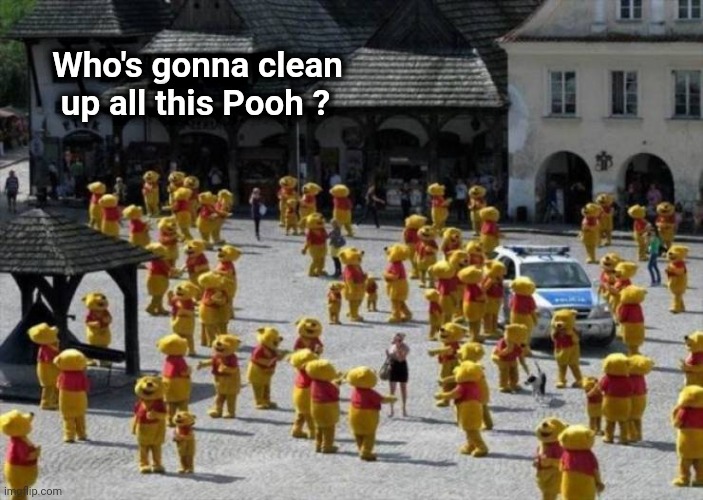Let’s face it, life can get messy—literally and figuratively. Whether it’s a cluttered room, a chaotic work schedule, or an overwhelming environmental issue, the question "whos gonna come clean this up?" often lingers in our minds. But hey, before we dive deep into solutions, let’s take a moment to acknowledge that cleaning up isn’t just about sweeping dust under the rug—it’s about taking responsibility and making meaningful changes.
We’ve all been there, staring at piles of clothes, dishes, or even unfinished projects, wondering who’s gonna step up and fix the mess. It’s not always easy to point fingers, but it’s even harder to ignore the problem. So, whether you’re dealing with personal clutter or global challenges, this article is your guide to tackling the chaos and finding answers to the question "whos gonna come clean this up?"
Now, here’s the kicker: cleaning up isn’t just about physical spaces. It’s about mental clarity, emotional balance, and yes, environmental sustainability. In a world where clutter seems to grow faster than we can organize it, it’s time to roll up our sleeves and get to work. But where do we start? Let’s find out together.
Read also:Parvati Shallow Net Worth
Table of Contents
- Why It’s Important to Address the Mess
- Common Causes of the Mess
- Taking Personal Responsibility
- The Environmental Impact of Mess
- Practical Tips for Cleaning Up
- Community Efforts and Initiatives
- Dealing with Mental Clutter
- Sustainable Practices for Long-Term Solutions
- Tools and Resources to Help You Clean Up
- Final Thoughts: Who’s Gonna Step Up?
Why It’s Important to Address the Mess
Let’s be honest, ignoring the mess doesn’t make it go away. In fact, it tends to get worse over time. Whether it’s a cluttered home, a disorganized workspace, or an environmental crisis, the consequences of neglecting the mess can be pretty serious. For instance, a messy home can lead to stress, decreased productivity, and even health issues. And when it comes to the environment, the stakes are even higher.
According to a report by the United Nations, global waste production is expected to increase by 70% by 2050 if current trends continue. That’s a lot of trash to deal with, folks. So, the question "whos gonna come clean this up?" isn’t just rhetorical—it’s a call to action. By addressing the mess, we’re not just improving our immediate surroundings; we’re also contributing to a healthier planet for future generations.
Mental and Physical Effects of Clutter
Clutter isn’t just an eyesore; it can have real effects on our mental and physical well-being. Studies have shown that living in a cluttered environment can increase stress levels and make it harder to focus. On the flip side, a clean and organized space can boost productivity and improve mood. So, if you’re feeling overwhelmed, it might be time to tackle that pile of laundry or clear out those old files.
Common Causes of the Mess
So, why does the mess happen in the first place? Well, there are a few common culprits. One of the biggest reasons is procrastination. Let’s face it, cleaning up isn’t exactly fun, and it’s easy to put it off until later. But as the saying goes, "later becomes never." Another factor is lack of time or energy. Between work, family, and other responsibilities, it’s no wonder we sometimes let things slide.
And then there’s the issue of overconsumption. In a world where fast fashion and disposable goods are the norm, it’s easy to accumulate more stuff than we need. This not only contributes to personal clutter but also to environmental pollution. So, before we start cleaning up, it’s important to understand the root causes of the mess.
Overconsumption and Waste
Speaking of overconsumption, did you know that the average American generates about 4.9 pounds of waste per day? That’s a lot of trash, and a lot of it ends up in landfills or polluting our oceans. To combat this, we need to rethink our consumption habits and focus on reducing waste. This might mean buying less, choosing reusable products, or supporting companies that prioritize sustainability.
Read also:Camilla Araujo
Taking Personal Responsibility
Now that we’ve identified some of the causes of the mess, it’s time to talk about personal responsibility. At the end of the day, the question "whos gonna come clean this up?" often comes down to each of us taking ownership of our own spaces and actions. This doesn’t mean you have to go it alone—teamwork and community support can make a big difference—but it does mean being proactive and making a conscious effort to improve.
For example, if you’re dealing with a cluttered home, start small. Pick one area to focus on each day, whether it’s the kitchen counter or a closet. Break the task into manageable steps, and before you know it, you’ll have made significant progress. And remember, cleaning up isn’t just about tidying up—it’s about creating a better environment for yourself and those around you.
Steps to Take
- Identify the areas that need attention
- Set realistic goals and timelines
- Involve family or friends for support
- Celebrate small victories along the way
The Environmental Impact of Mess
When we talk about cleaning up, we can’t ignore the environmental impact. From plastic pollution to deforestation, the mess we create as a society has far-reaching consequences. For example, plastic waste is one of the biggest environmental challenges we face today. It harms wildlife, contaminates water sources, and takes hundreds of years to decompose.
But here’s the good news: we can make a difference. By reducing our use of single-use plastics, recycling properly, and supporting eco-friendly initiatives, we can help clean up the planet. And it’s not just about individual actions—governments, businesses, and communities also play a crucial role in addressing environmental issues.
Plastic Pollution Solutions
So, what can we do about plastic pollution? Here are a few ideas:
- Use reusable bags, bottles, and containers
- Participate in beach or park cleanups
- Support legislation to reduce plastic waste
- Educate others about the impact of plastic pollution
Practical Tips for Cleaning Up
Okay, let’s get down to business. If you’re ready to tackle the mess, here are some practical tips to help you get started:
- Declutter regularly—donate or sell items you no longer need
- Create a cleaning schedule to stay on track
- Use eco-friendly cleaning products to reduce chemical exposure
- Involve the whole family to make it a team effort
And remember, cleaning up doesn’t have to be a chore. With the right mindset and tools, it can actually be a rewarding experience. Plus, the sense of accomplishment you’ll feel when you’re done is totally worth it.
Eco-Friendly Cleaning Products
When it comes to cleaning, using eco-friendly products is a great way to reduce your environmental impact. Look for products that are biodegradable, non-toxic, and free of harmful chemicals. You can also make your own cleaning solutions using ingredients like vinegar, baking soda, and lemon juice. Not only are they effective, but they’re also affordable and safe for the whole family.
Community Efforts and Initiatives
Speaking of teamwork, community efforts can make a huge difference when it comes to cleaning up. Whether it’s organizing a neighborhood cleanup or supporting local environmental groups, working together can amplify our impact. For example, many cities have programs to reduce waste, increase recycling, and promote sustainability. By getting involved, you can help create a cleaner, healthier community for everyone.
And don’t underestimate the power of volunteering. Whether it’s planting trees, cleaning up parks, or educating others about environmental issues, there are plenty of ways to make a difference. So, if you’re wondering "whos gonna come clean this up?" the answer might just be you and your community.
How to Get Involved
- Join local environmental groups or initiatives
- Participate in cleanup events or volunteer opportunities
- Advocate for policies that support sustainability
- Educate others about the importance of cleaning up
Dealing with Mental Clutter
While we’re on the topic of cleaning up, let’s not forget about mental clutter. Just like physical clutter, mental clutter can weigh us down and affect our well-being. Whether it’s unfinished tasks, negative thoughts, or overwhelming emotions, it’s important to address the mental mess in our lives.
One way to tackle mental clutter is through mindfulness practices like meditation or journaling. These activities can help you clear your mind, focus on the present moment, and prioritize what’s important. Another strategy is to set boundaries and learn to say no to things that don’t align with your goals or values. By doing so, you can create more space for the things that truly matter.
Mindfulness Practices
Here are a few mindfulness practices to help you deal with mental clutter:
- Meditation—spend a few minutes each day focusing on your breath
- Journaling—write down your thoughts and feelings to process them
- Gratitude practice—focus on the positive aspects of your life
- Time management—prioritize tasks and set realistic goals
Sustainable Practices for Long-Term Solutions
Finally, let’s talk about sustainable practices for long-term solutions. Cleaning up isn’t just about fixing the immediate mess—it’s about creating systems and habits that prevent future clutter. This might mean adopting a minimalist lifestyle, reducing waste, or supporting sustainable businesses.
For example, you can reduce waste by choosing products with minimal packaging, composting food scraps, and repairing items instead of replacing them. You can also support sustainable businesses by buying from companies that prioritize environmental responsibility. By making these changes, you’re not just cleaning up today—you’re setting the stage for a cleaner tomorrow.
Sustainable Lifestyle
Here are a few ideas for living a more sustainable lifestyle:
- Reduce energy consumption by turning off lights and unplugging devices
- Use public transportation, carpool, or bike whenever possible
- Buy local and seasonal produce to reduce your carbon footprint
- Support organizations working toward environmental sustainability
Tools and Resources to Help You Clean Up
Of course, no cleanup is complete without the right tools and resources. From cleaning supplies to organizational systems, there are plenty of tools available to help you get the job done. For example, you might want to invest in a good vacuum cleaner, storage containers, or a planner to keep track of tasks. And don’t forget about digital tools like apps for organizing files or scheduling tasks.
There are also plenty of resources available online, from blogs and videos to podcasts and books. These can provide valuable tips, inspiration, and motivation as you work to clean up your space, mind, and environment.
Final Thoughts: Who’s Gonna Step Up?
So, who’s gonna come clean this up? The answer, my friend, is you. Whether it’s cleaning up your home, your mind, or the planet, the responsibility falls on each of us to take action. But remember, you’re not alone. By working together, supporting each other, and making conscious choices, we can create a cleaner, healthier world for everyone.
Now, it’s your turn. Take a moment to reflect on the areas in your life that need attention


